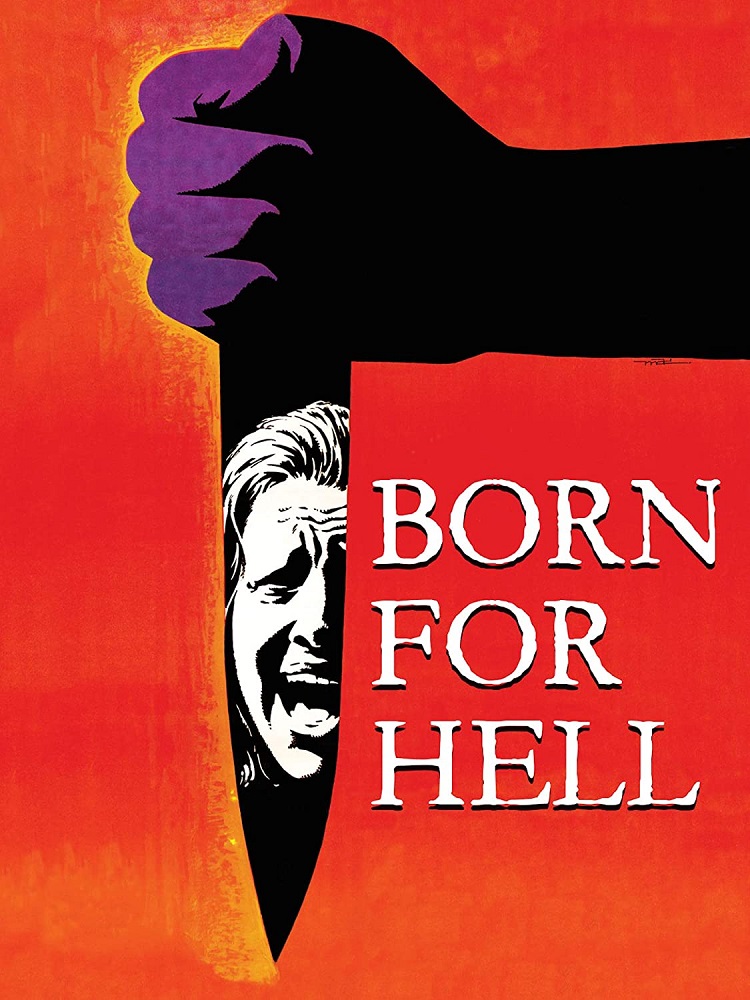
During one long, hot night in Chicago in the summer of 1966, Richard Speck held nine student nurses hostage. Over the course of several hours, he led eight of them, one by one, into another room where he stabbed them to death with a knife. One nurse survived by hiding under the bed. In 1976, French-Canadian director Denis Héroux made Born for Hell, a loose retelling of the Speck murders. He moved the setting to Belfast, Northern Ireland, set it amidst the turmoil of The Troubles, and made the killer a Vietnam veteran. Severin Films has just released a new Blu-ray of the film with loads of special features.
Cain Adamson (Mathieu Carrière) has just finished his tour of duty in Vietnam and is headed home to America on a ship. On a whim, he jumps ship in Belfast. The next boat to America doesn’t leave for a few days and he’s got no money so he just bums around the city. While playing pinball at a local pub, he spies some pretty nursing school girls walking to their house. He spends the night in a shelter where he meets a Vietnamese man. As a way of introduction, he shows him his medal and says it was for “greasing a lot of gooks.” He saves an old prostitute from being pummeled by a couple of johns. She offers him a freebie. He asks her to dance instead then walks out disgusted by her.
The nurses come home each day exhausted but happy. They argue over whose turn it is to cook and clean. They watch the news, and call their boyfriends and their mothers. The house is exclusively female and they feel safe inside. The film takes its time, allowing us to get to know each of them. At least a little bit.
It takes its time with a lot of things. If you come to this film expecting it to jump right into the killing spree, you will be disappointed. It does get there and once it does it delivers on what a film like this promises, but it does make you wait for it.
One evening, the nurses throw a birthday party. Cain watches them through a window then slips in through the back door. Two of the girls see him and take him as a homeless beggar. They give him some food and cake, and are very kind to him. He seems strange, but appreciative. The next evening, he breaks in and kills them.
Juxtaposed against all that tedious character building and the slaughter of the innocents is The Troubles. That was the historic clash between the Catholics and the Protestants over whether Northern Ireland should join the rest of Ireland or remain a part of the United Kingdom. Cain is often asked by the police to see his papers. We see a church bombed and several skirmishes of gunfire on the streets. There are news reports of the violence happening across the country and the world. Cain’s murders, the film seems to suggest, are just one additional act of violence in a universe full of them. This should give the film some thematic heft, but it never quite grasps anything meaningful. It is too exploitative for the art-house crowd, and too damn slow for the grindhouse.
Héroux shoots it in a naturalistic, almost documentary style. The only music is diegetic. The camera angles and lighting are all natural looking. This gives the film a lived-in feel but it also keeps the tension down. The scenes in which Cain is removing the girls one by one from their bedroom ought to be full of tension. You ought to feel the absolute terror of the characters, but all I felt was discomfort at the exploitative nature of such scenes. I felt bored when I should have been at the edge of my seat.
I wish it had either delved deeper into its themes or played up more of the exploitative elements of the film. As it is, it seems stuck between being an art film and a pulpy b-film while simultaneously not giving us enough of either piece to make it interesting.
Severin’s release of Born for Hell comes with a slew of extras that will surely help you appreciate the film. These include a new interview with Mathieu Carrière, and another one with artist Joe Coleman. There is video essay from filmmaker Chris O’Neill. Local Chicago filmmakers John McNaughton and Gary Sherman talk about the Richard Speck murders as does podcaster Esther Ludlow, both of which I found more interesting than the film itself. Also included is Naked Massacre, which was what the film was called when released and re-edited in the United States. The film was scanned in 2K from an uncut 35mm print discovered in The National Archives of Canada.